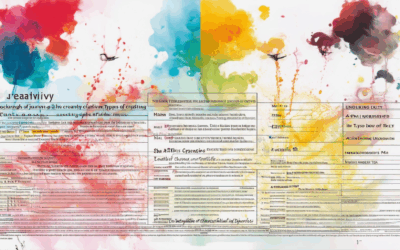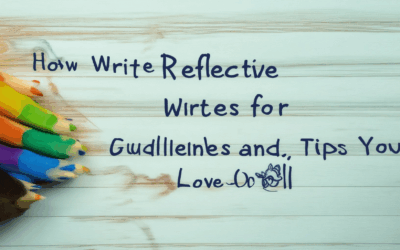Are you aiming to excel in your poetry classes or prepare for AP Literature exams? If so, mastering the art of writing reflective poetry essays and delving into the nuances of poetic analysis is essential. This comprehensive guide offers a detailed exploration of reflective poetry essays, providing valuable insights and strategies to help you craft compelling pieces. Whether you’re a seasoned writer or just beginning, this guide will walk you through the complexities of poetry essays, reflection, and how to approach AP Literature poetry assignments with confidence. From understanding the role of reflection in poetry to learning how to structure a poetry essay effectively, this resource covers everything you need to succeed. Discover practical tips, examples, and resources that will enhance your ability to write thoughtful and insightful poetry essays. Start your journey towards mastery today!

Writing a Reflective Essay on a Poem
To craft a reflective essay on a poem, follow these organized steps:
- Introduction : Begin by introducing the poem and stating its central theme. For example, in Robert Frost’s “The Road Not Taken,” the theme revolves around decision-making and the uncertainty that accompanies it.
- Themes and Symbols : Analyze the poem’s themes, such as the choice between two paths symbolizing different life paths. Discuss recurring symbols like the woods, representing the unknown future.
- Language and Imagery : Examine the poem’s language and imagery. Note how elements like the fork in the road and the sigh of the wind convey melancholy and nostalgia.
- Emotional Tone : Explore the poem’s emotional tone, which is melancholic, reflecting on missed opportunities. Consider how the language contributes to this mood.
- Structure and Form : Discuss the poem’s structure, including rhyme scheme and meter, which contribute to its impact. Compare it to other works by Frost or broader literary themes.
- Personal Reflection : Conclude by restating key points and sharing personal insights. Reflect on how the poem’s themes resonate with life’s decisions and their consequences.
This structured approach ensures a comprehensive and insightful reflective essay, offering deeper analysis and personal connection to the poem’s themes.
How to Write a Poetry Essay
To write an effective poetry essay, follow these organized steps:
1. Understand the Purpose
Your goal is to analyze and interpret a poem, exploring its themes, symbols, and historical context. Aim to provide insight into the poet’s intent and the poem’s significance.
2. Read Carefully
Start by reading the poem silently several times to grasp its overall mood, imagery, and narrative. Jot down initial thoughts and questions about the poem’s meaning.
3. Break Down the Poem
Analyze each stanza or section individually. Look for patterns, recurring motifs, and symbolic elements that contribute to the poem’s central theme.
4. Identify Key Elements
Examine the poem’s structure, rhyme scheme, and meter. Consider how these elements contribute to the poem’s atmosphere and emotional impact.
5. Research the Poet and Context
Research the poet’s background, historical period, and literary movement. Understanding the cultural and historical context can deepen your analysis.
6. Explore Interpretations
Consider different interpretations of the poem. Explore how various critics or scholars have analyzed it, and weigh your own opinions against theirs.
7. Connect to Broader Themes
Link the poem’s themes to broader literary movements or societal issues. Show how the poem reflects or challenges contemporary concerns.
8. Write a Clear Thesis
Formulate a strong thesis statement that encapsulates your analysis. This will guide your essay’s structure and focus.
9. Organize Your Essay
Structure your essay with an introduction, body paragraphs, and conclusion. Each body paragraph should address a specific aspect of your analysis.
10. Edit and Revise
Review your draft for clarity, coherence, and grammatical accuracy. Ensure your arguments are well-supported and your analysis is thorough.
Additional Tips
– Read the poem aloud to appreciate its rhythm and cadence. – Use quotes and references to support your analysis. – Stay objective while expressing your interpretation. – Maintain a formal tone suitable for academic writing.
By following these steps, you can craft a well-structured and insightful poetry essay that engages with the text on multiple levels.

How to Write a Poetry Essay in AP Lit
To write a successful poetry essay in AP Literature, follow these organized steps:
- Choose a Poem : Select a poem that interests you and is well-analyzed in literary criticism. Robert Frost’s “The Road Not Taken” is a popular choice due to its complex themes and symbolism.
- Outline Your Essay :
- Introduction : Introduce the poem, state your thesis, and provide background on the poet.
- Body Paragraphs :
- Discuss themes (e.g., choice, uncertainty).
- Analyze symbols (e.g., the fork in the road as a metaphor for decision-making).
- Include historical context, such as the influence of Romanticism on the poem’s themes.
- Address critical perspectives and potential criticisms of your interpretation.
- Conclusion : Summarize your analysis, restate your thesis, and reflect on the poem’s impact.
- Analyze Themes : Look for recurring ideas and connect them to broader existential themes, such as life’s uncertainties.
- Interpret Symbols : Use the fork in the road as a metaphor for decision-making and compare it to other literary symbols in works like Shakespeare’s Hamlet or F. Scott Fitzgerald’s The Great Gatsby .
- Consider Historical Context : Discuss how the poem’s themes align with the Romantic period’s emphasis on individualism and nature.
- Incorporate Critical Perspectives : Research how other critics interpret the poem and present a well-rounded analysis, including common criticisms.
- Conclude Thoughtfully : Reflect on the poem’s emotional resonance and its lasting impact, possibly ending with a thought-provoking statement.
- Practice Timed Essays : Simulate exam conditions to improve time management and ensure all sections are addressed.
- Revise and Seek Feedback : Edit for grammar and clarity, and seek input from teachers or peers to enhance your analysis.
By methodically addressing each component and integrating evidence-based analysis, you can craft a compelling and insightful poetry essay that meets AP Lit standards.

Reflection in Poetry
Reflection in poetry refers to the process of examining ones own thoughts, feelings, and experiences through the lens of literature. It is a technique that allows writers and readers to delve deeper into the meaning of words, explore underlying themes, and uncover hidden truths.
How Does Reflection Work in Poetry?
Reflection in poetry often involves introspection and self-examination. It allows the poet to look beyond the surface of their words and uncover deeper layers of meaning. This process can reveal personal growth, emotional exploration, and universal truths that resonate with readers.
Techniques Used in Reflective Poetry
Poets use various techniques to achieve reflection in their work. These include:
- Imagery: Using vivid descriptions to evoke personal associations and emotions.
- Symbolism: Employing symbols that carry profound meaning and encourage introspection.
- Stream of Consciousness: Writing in a manner that mimics the flow of thought, allowing for spontaneous reflection.
- Irony and Contradiction: Creating tension that forces readers to reconsider their assumptions.
Examples of Reflection in Poetry
Many famous poems exemplify the concept of reflection. For instance:
- “Mirror” by Sylvia Plath explores the idea of self-reflection through the image of a mirror, revealing both beauty and deformity.
- “The Lake District” by William Wordsworth reflects on nature and the poet’s connection to it, offering a window into his inner world.
- “Ariel” by Dante Gabriel Rossetti uses imagery of water and glass to symbolize reflection and self-contemplation.
The Role of Reflection in Poetry
Reflection in poetry serves as a bridge between the personal and the universal. It allows poets to express complex emotions and ideas that resonate with readers on a deeply personal level. By inviting introspection, reflective poetry enriches the reading experience and fosters a deeper appreciation for literature.
Exploring Reflection Further
To learn more about reflection in poetry, you can visit our Silken Drum platform. We offer resources, articles, and community discussions dedicated to helping writers and readers explore the art of reflection in poetry and beyond.
How to Write a Reflection Essay
A reflection essay is a personal and introspective piece of writing where you explore your thoughts, feelings, and experiences regarding a specific topic. Below are some steps and tips to guide you through the process:
- Choose a Topic
Select a subject that resonates with you personally. It could be an event, a memory, a feeling, or even a concept like love, loss, or identity. The topic should be something meaningful enough to spark your curiosity and allow for deeper exploration. - Organize Your Ideas
Before diving into writing, take some time to brainstorm and organize your thoughts. Consider questions like: What happened? How did it make me feel? What does it mean to me? Creating a mind map or list of key points can help structure your essay. - Express Emotions Honestly
A reflection essay thrives on authenticity. Write about your true feelings, whether they’re positive, negative, or a mix of both. Sharing vulnerability can make your essay more relatable and impactful. - Include Evidence From Personal Experiences
To strengthen your reflection, incorporate specific details from your life. Use anecdotes, quotes, or descriptions of moments that highlight your journey or growth. - Reflect on Meaning and Purpose
After recounting your experiences, delve into what they mean for you. Consider how these events have shaped your beliefs, values, or understanding of yourself. This deeper analysis will give your essay its reflective dimension. - Revise and Edit
Once you’ve drafted your essay, read it carefully and make revisions to enhance clarity, grammar, and coherence. Ensure your narrative flows logically and your arguments are well-supported.
By following these steps, you can craft a thoughtful and meaningful reflection essay that offers insight into your personal growth and understanding.

How Does Poetry Help Us Think and Reflect?
Poetry is a powerful tool for fostering introspection, creativity, and emotional understanding. It allows us to explore complex emotions, examine our thoughts, and connect with our inner selves in a meaningful way. Here’s how poetry aids in thinking and reflecting:
- Cognitive Enhancement : Poetry engages multiple cognitive processes, including memory, imagery, and metaphorical thinking. By exposing readers to vivid descriptions and abstract concepts, poetry stimulates the brain, enhancing cognitive function and critical thinking skills.
- Emotional Processing : Poems often delve into the depths of human emotion, offering solace, inspiration, and understanding. Reading or writing poetry can help individuals process their own emotions, providing a safe space to confront and navigate feelings.
- Creative Problem Solving : Poetry encourages lateral thinking by challenging conventional logic. By approaching problems from a unique perspective, writers often find innovative solutions, making poetry a valuable tool for creative brainstorming.
- Self-Reflection and Growth : Poetry serves as a mirror, reflecting our inner lives. It prompts self-examination, helping individuals identify patterns, strengths, and areas for growth. Through poetry, we can gain deeper insight into ourselves and our surroundings.
- Connection to Others : Poetry bridges cultural gaps and connects people across generations. It creates a shared language that transcends boundaries, fostering empathy and understanding among diverse communities.
Poetry is not just art; it’s a mental exercise that sharpens our minds and enriches our lives. By embracing poetry, we unlock new ways of thinking, feeling, and growing, making it a timeless medium for self-discovery and transformation.
Silken Drum is a platform dedicated to celebrating creative expression and fostering meaningful connections through poetry and literature. Explore our resources to discover the transformative power of poetry and how it can enhance your thinking and reflection.




0 Comments